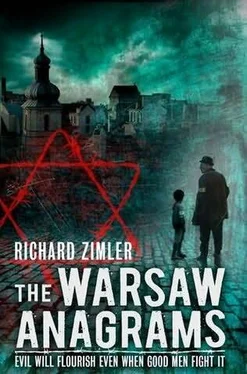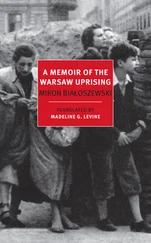Back in his workroom, he handed me his hat. He already had his muffler on and was buttoning his coat.
‘So, what’s your problem, Dr Freud?’ he asked when he was done, lifting those furry eyebrows of his; I must have been showing him a puzzled look.
‘Nothing,’ I replied; by then, I’d realized that having him join me was the real reason I’d come over.
‘Watch this!’ he said, and he pulled a white silk handkerchief from out of nowhere – a trick from his days of performing magic shows aboard the Bourdonnais , the French ocean liner on which he’d worked as a steward in his youth.
‘What’s that for?’ I asked.
Folding it in a square, he put it in my breast pocket. ‘Now you look a man not to be taken lightly!’ he observed triumphantly.
‘Or maybe just a well-dressed zookeeper,’ I retorted.
Rabe hadn’t yet arrived at 1 Leszno Street. We paid our ten złoty to a teenage guard wearing diving goggles; the cellar had recently become a rickshaw assembly plant and he doubled as a welder. About twenty men and boys – bare-chested and dripping with sweat – were hammering bicycle wheels, filing fenders, patching tyres… Izzy and I headed past them to the back, as we’d been instructed. The smell of burnt rubber and axel grease packed my nose. We climbed up a set of stairs to a scarred wooden door.
‘Could it be this simple?’ he asked.
I turned the brass handle and pushed open the door. We were in a dimly lit hallway. The guard we’d been told about had a grim moustache and dull eyes. He was eating an apple. Looking us up and down, he said in a gruff Polish, ‘Take off your Jewish armbands.’
Once they were safely hidden in our pockets, he pointed to a rickety wooden staircase at the end of the hallway. ‘One flight up,’ he grumbled.
We came to a door giving out on a courtyard with a marble fountain at the centre: Pan balancing on one leg and playing his flute. Crossing over the flagstones, we entered the front hallway. Empty wooden crates were scattered around. We pushed through the front door into a sunlit street.
Izzy and I stopped right away, staring at the buildings around us like dazed insects after a thunderstorm.
The biggest difference was the smell, though I didn’t realize that until we’d walked for twenty minutes and were standing under the spires of the Holy Cross Church. The pet-shop stink of the ghetto had disappeared.
We whispered our amazement in Polish; we dared not speak Yiddish outside our own territory.
Walking ahead, I tried to regain the confident gait of the Before Time – as I’d come to think of the time prior to the German occupation of Warsaw – but I kept lapsing into the hunched shuffle we’d all acquired. The ghetto paso doble, Izzy called it.
A dozen or so drunken German soldiers were singing disconnected harmonies on a melody I didn’t recognize while wavering along the sidewalk in Zbawiciela Square. Hunching our shoulders, we made ourselves as compact as possible and rushed the other way around the traffic circle.
‘We must look like two fucking matzo balls!’ Izzy whispered to me.
In more favourable circumstances, I’d have burst out laughing.
Disappearing into the crowds on Marszałkowska Street made me shudder with relief. And good memories cheered me, too; Hannah and I used to come shopping here when we were courting – safe from our nosy parents and their gossip-greedy spies.
Feeling safe, I punched Izzy on the arm – hard enough to stun him but not to hurt.
‘What’s that for?’ he asked, feigning anger.
‘For trying to make me laugh in front of German soldiers.’
‘So, what other choice do I have?’ he asked, giving a Yiddish lilt to his question.
I turned in a circle to take in the dimensions of our temporary escape – and to gauge our vulnerability. No one was staring at us. A good sign.
‘The thing that troubles me,’ I told Izzy, ‘is that I don’t think anyone on this side of the border knows yet that Adam is dead. They probably don’t want to know anything of what we’re going through.’
Izzy spoke to me then about how my nephew’s murder had damaged his faith, using his idiosyncratic clockmaker’s metaphors – bent springs, wayward escape wheels… I listened closely to his stop-and-start confessions because I sensed he’d never reveal his heart to me like this inside the ghetto, and I was touched that he would risk talking to me of God, since I’d always been such an obstinate atheist. When he was done, I stared into the despair of his eyes, and it seemed that our friendship was the only way either of us would make it out of the frigid ocean we’d found ourselves in.
I whispered to him the one-line poem I’d been saving: ‘Children are transformed into adults on passing through the threshold of Gehenna.’
‘And what about adults themselves?’ he asked.
‘I’ll have to think about that.’
As we walked on, I realized the time had arrived to broach a subject that had come close to drowning our friendship forty years earlier. ‘Listen, Izzy, I’m sorry for disappointing you all those years ago. I was awful to you. Forgive me.’
He came to a halt, stunned.
‘I should have apologized years ago,’ I continued. ‘I was a fool.’
It was good that we were speaking Polish; it was easier to venture out of my usual self in a language that wasn’t the one I’d been living in of late.
He gazed down, unsure of how to reply. His jaw was throbbing. ‘You didn’t know what damage you could do. We were both too young to behave like men.’
For men , he risked using the word mensch , and its Yiddish nuances implied that we hadn’t been ready to be good and generous with each other – let alone, with everyone else.
He and I stepped a little lighter across the rest of the journey that day, and I realized it no longer mattered that we’d never shared a bed; we were together now. Our renewed closeness was the one thing for which we owed the Nazis our thanks.
Soon, a troubling question came to me, however: might Adam’s killer also have been freed from previous taboos by the German occupation?
Paweł’s building was in the Stary Mokotów neighbourhood, an elegant section of the city guarded by broad, bare-limbed linden and birch trees. Two marble caryatids with smashed noses flanked the entryway. The tile floor – a checquerboard pattern – was sticky. The post box for 5B was labelled Sawicki.
‘I really hope Paweł’s mother will be as intimidated by Germans as most Poles,’ I told Izzy.
He and I had reasoned that the boy’s father would be at work.
‘Growl at her every now and again – like you do at me,’ he replied, grinning. He gave me a little shove towards the staircase – one soldier to another. ‘ Festina lente ’ – hurry slowly – he added, shaking a teacherly finger; it was what our Latin professor, Dr Borkowski, used to tell us when the bell rang at the end of class.
Izzy waited downstairs. On the fifth-floor landing, I untied my scarf, took off my gloves and put on the Nazi armband that Mrs Rackemann had managed to secure for me. The swastika raised gooseflesh, but it also freed my imagination – the paradox of a good deception.
An attractive woman in a pink, floor-length nightgown – with silly carnation-like tufts of fur on her cuffs – answered my knocks. I’d have guessed she was forty, though her chestnut-brown hair was cut in a long fringe, which had the effect of making her look girlish. She had an intelligent face, but hard.
‘Mrs Sawicki?’ I asked, taking off Izzy’s Borsalino.
‘Yes.’
‘My name is Honec. I’m sorry to bother you. I’m from the Reich Ministry of the Interior.’
I gave my voice the shading of an Austrian accent – I’d decided that, like me, Honec had lived in Vienna for a time.
Читать дальше












